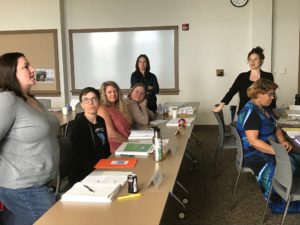By Jill Winsor
 Once again, we here at Neighborhood Partnerships are blown away by the level of dedication and care our partner organizations show the communities they serve.
Once again, we here at Neighborhood Partnerships are blown away by the level of dedication and care our partner organizations show the communities they serve.
A few weeks ago, Laina and I had the opportunity to spend two days in Astoria with folks from CASA of Oregon – Rebekah Barger, Innovative Changes – Rachell Hall, Metropolitan Family Service – Amanda Hart, Sara Epstein, and Water Berry, NeighborImpact – Sonia Capece and NeighborWorks Umpqua – DeAna Nelson and Sami Stephens. As a group, we took a closer look at the content in the Your Money, Your Goals toolkit.
Each participant gave an hour-long presentation to the group on one of the toolkit’s modules from dealing with debt to choosing financial products. Laina and I were so impressed by the quality of presentations from this incredible group of people. Our participants brought concrete information, examples from their experience working with clients and from their own personal experience, and thoughtful questions to draw out the input and expertise of our other group members. We watched as our participants shared with and supported one another. We were overwhelmed by the utmost respect and love this group of folks shared when talking about the communities they serve and participate in.
As a group, we got pretty personal, sharing stories about our understanding and feelings toward money as well our specific community and culture’s relationship with financial resources. This is where the beauty of the toolkit lies. As Laina likes to say, the toolkit serves a double-duty. It gives service providers the information and tools they need to better engage clients in conversations about their finances. But it also allows providers and case managers themselves to more fully explore their own relationship with these same ideas and tools.
Money is an emotionally charged topic. It makes sense that in order to provide solid and authentic support to our community members we might need to do a little bit of our own work. I believe that our communities will be more financially resilient when more of us are comfortable talking openly about our own relationships with money. If more of us are able to admit that we don’t have this all figured out, that we’ve relied on a “loan” from a relative to get us through a crisis, we’ve faced huge barriers, and we have a hard time making ends meet, we will go a long way to reducing the stigma and silence that build a sense of shame and loneliness within our communities.
We know that the wonderful people who joined us in Astoria will do an amazing job sharing this resource with their organizations and their partner organizations. Each time they provide a Your Money, Your Goals training in the future, we know that we will get a little bit closer to building a broader community brave enough to have honest and authentic conversations about money and a little bit closer to increasing the financial well-being of the state of Oregon.
Give us a call or send us an email if you’d like to learn more about the toolkit or request a training. We want to get this into as many hands as possible and we can’t wait to hear from you.
Jill Winsor: jwinsor@neighborhoodpartnerships.org, 503.226.3001 x 118
